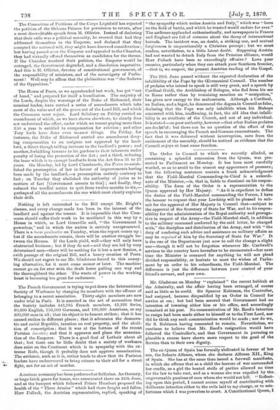The Order in Council to which we recently alluded, as
containing a splendid concession from the Queen, was pre- sented to Parliament on Monday. It has been most carefully worded, so as to avoid to the utmost any appearance of pressure ; but the following sentences contain a frank acknowledgment that the Field-Marshal Commanding-in-Chief is a subordi- nate of the Minister,—is, that is, liable to dismissal on his respon- sibility. The form of the Order is a representation to the Queen approved by Her Majesty. "As it is expedient to define the duties of the Field-Marshal commanding the Forces, I have the honour to request that your Lordship will be pleased to sub- mit for the approval of Her Majesty in Council that—subject to the approval of the Secretary of State for War, and to his respon- sibility for the administration of the Royal authority and preroga- tive in respect of the Army—the Field-Marshal shall, in addition to the military command conferred by the said letter, be charged with," the discipline and distribution of the Army, and with "the duty of rendering such advice and assistance on military affairs as may be required of him by the Secretary of State for War." It is the cue of the Department just now to call the change a slight one—though it will not be forgotten whenever Mr. Cardwell's services to the country have hereafter to be enumerated—but next time the Minister is censured for anything he will not plead divided responsibility, or hesitate to meet the wishes of Parlia- ment by an order to his subordinate, the Field-Marshal. The difference is just the difference between your control of your friend's servant, and your own.






























 Previous page
Previous page